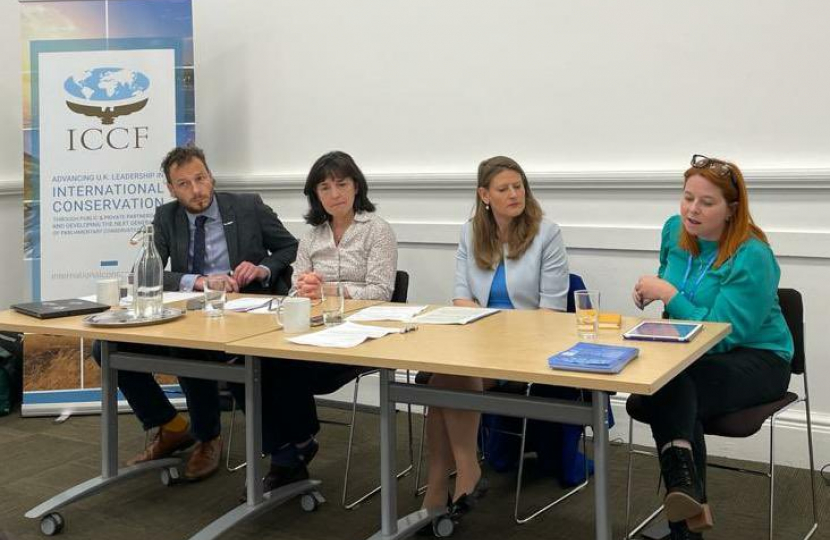
At Conservative Party Conference, Theo Clarke MP for Stafford held a panel discussion on Marine 30 by 30 and the importance of global leadership on marine conservation. Britain founded the Global Ocean Alliance 30 by 30 initiative, which aims to protect at least 30% of the global ocean by 2030. Ms Clarke led a discussion with experts from the RSPB, the Marine Conservation Society and The Pew Trusts. As Chair of the All Party Parliamentary Group on International Conservation, Ms Clarke was pleased to host this important discussion on how to protect the world’s oceans ahead of COP26.
Theo Clarke MP’s speech:
Thank you to everyone joining us, ahead of COP 26 in Glasgow next month, for this important panel on marine conservation.
Oceans make up over 70% of the world’s surface and it is estimated that oceans generate half of the Earth’s oxygen, so their health is critical for both our lives and the future of our planet. Our seas act as a climate regulator, absorbing 93% of additional global heat as well as a quarter of human-driven CO2 emissions. Managed properly, our seas could, not only provide a biodiverse marine environment, but they could also play an additional role by acting as a carbon sink and absorbing CO2, helping to tackle climate change.
Sadly, today our oceans are warming and becoming more acidic, which poses a threat to delicate ecosystems, such as coral reefs, which support precious marine species. Devastatingly, plastic pollution has been found in every corner of the planet and marine life such as seabirds, dolphins, whales and turtles are dying due to becoming tangled in and ingesting plastic. When I hosted Sir David Attenborough at an event exploring how Britain can take a leading role in the fight against plastic pollution, Sir David cited the harrowing statistic that of the 400 million tonnes of plastic produced globally each year, 10 million tonnes ends up in our oceans. To me it is clear that this is a man-made issue, that we humans need to tackle.
Part of the solution is stopping pollution entering our oceans in the first place, which is why I recently co-sponsored the Sewage (inland waters) Bill in Parliament, which aims to improve the quality of our rivers and waterways in Britain. I welcome that the Government has now confirmed that a key aspect of this Bill - placing a duty on water companies to ensure that untreated sewage is not dumped into rivers and other waters- will be enshrined into law, helping to keep waterways in my Stafford constituency clean and also preventing additional pollution from going into the ocean and being spread across the globe.
It is right that we are taking action here at home and that the UK has created over 370 marine protected areas covering over 35% of our country’s waters but neither water nor pollution keeps to territorial boundaries, which is why we must do more to ensure that our seas are protected across the world. I welcome that in 2018 the Government pledged over £65 million to boost global research and help countries across the Commonwealth stop plastic waste from entering the oceans. Britain has played a world-leading role in tackling plastic pollution, but we must not rest on our laurels. In 2010 world leaders pledged to protect 10% of the worlds oceans but now, in 2021, it is clear that we must go further.
The UK’s Blue Belt programme is an excellent example of how we as Global Britain can act to protect oceans. The Blue Belt Programme safeguards biodiversity, wildlife habitats and ecosystems in some of the remotest places on Earth – covering an area 17 times the size of the UK. Protecting waters of British Overseas Territories including Ascension Island, the British Antarctic Territory and St Helena, and saving some of the world’s most pristine marine environments for generations to come.
I am also delighted that Britain is leading as the founder of the Global Ocean Alliance 30by30 initiative, which aims to protect at least 30% of the global ocean by 2030. It is a testament to Global Britain’s determination and diplomacy that at the 76th UN General Assembly last month we had signed up over 100 countries to support the 30by30 initiative. This demonstrates that there is strong international support for protecting our oceans and I look forward to hearing from our panellists, Julian Jackson, Senior Officer on the Protection of Ocean Life on the High Seas for the Pew Charitable Trust, Dr Chris Tuckett the Director of Programming for the Marine Conservation Society and Ali Plumber from the Royal Society for the Protection of Birds, how- with only nine years until 2030- we can best make our 30by30 vision a reality and save our seas.
